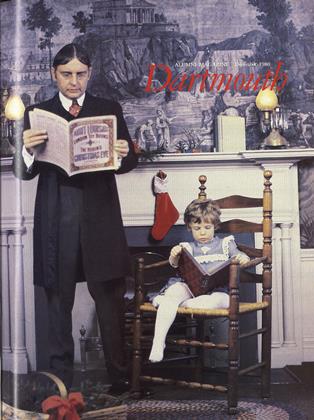NUMBER 1 by Billy Martin & Peter Golenbock '67 Delacorte, 1980. 272 pp. $11.95 THE IMPERFECT DIAMOND by Lee Lowenfish & Tony Lupien Stein and Day, 1980. 258 pp. $12.95
"If you want to see real teaching," John Dickey used to say, "go to the practice field." Few teachers have taught more effectively on that field than Tony Lupien, who coached Dartmouth baseball from 1956 to 1977, and in The Imperfect Diamond, which he has written in collaboration with Lee Lowenfish, Lupien has something to teach all of us. His general subject is the relationship between baseball players and club owners, the dollars-and-cents, contractual side of the game. Specifically, he traces the history of the players' association from its beginnings in 1890 to the present.
The book was conceived, he tells us, when he and Lowenfish came together in 1978 at a meeting of the Society for American Baseball Research in Paramus, New Jersey, the day before Bob Lemon succeeded Billy Martin as manager of the New York Yankees. In Lupien's words, "Two divergent backgrounds with a generation gap thrown in. Lee Lowenfish, a student, historian, teacher, and baseball buff, on the one hand. On the other, Tony Lupien, at the twilight of a fifty-year love affair with the game of baseball, beginning on the sandlots of Lowell, Massachusetts, then a professional career encompassing playing, managing, and scouting, ending up as a twenty-one-year college coach."
I suspect that most of us are a little impatient when we read about baseball holdouts and threatened players' strikes. I am afraid we all tend to identify with the owners, and I am also afraid that we do it for the wrong reasons. Lupien writes his book from the players' point of view. In addition to threading his way through the intricate history of the players' association, he also includes fascinating vignettes of the various people, players and owners, who were involved in all that has happened during the last 90 years.
On the other hand, Golenbock's book about Billy Martin is a "whole nother smoke," as we used to say. No careful research here, but there is plenty for the real fan and for the curious (why did Billy hit that marshmallow salesman?). If you enjoyed The Bronx Zoo, as told to Golenbock by Sparky Lyle, you will also enjoy Number I, though for different reasons. There is a driving motivation in Billy Martin that all baseball fans, as well as amateur shrinks, have analyzed for decades. Martin had talent, but he played on a team of even more talented players. But given a certain level of ability, baseball games are won by drive and hustle. Billy Martin played with a special intensity that set him apart.
Obviously, he set himself apart from George Steinbrenner, and that strange relationship is examined, if not explained. We learn a lot about Martin and about the Yankees from this book, but we also learn something about ourselves. Whether we are casual or rabid fans, we are all part of this spectacle, this zoo, this showbiz which is baseball. Whether we pay for tickets or switch on the TV, we become a part of the scene of present-day sports if we observe at all.
The Imperfect •Diamond is thoughtful and provocative. Number 1 is' fast and breezy. Both belong on our shelves if we are baseball fans. While Lupien and Lowenfish's book tells us where baseball has been and where it is going, Golenbock and Martin tell us where baseball is (or is at). Both books tell us a lot about ourselves as well as about ball players owners, and we may not like all that we can see.
Lupien examines the reserve clause very thoughtfully and explores the relationship of player to owner, slave to master. Billy Martin, growing up as a poor, tough kid, does not examine or explore. Lupien's Harvard degree may have mystified many of his fellow professionals from Class D to the majors, but it's a safe bet no one tried to capitalize on his gentility twice. Survival in organized baseball meant being very tough when Lupien and Martin were struggling through the system.
The bitterness that the professional athlete feels and manifests from time to time in various ways is more readily understandable when we gain a deeper knowledge of what really happens behind the scenes. Thanks to tough and intelligent battlers like Tony Lupien, today's professionals are better paid and better treated. Lupien's concluding remarks about the future of organized baseball, as he foresees it, are worth the price of the book by themselves. This is the gospel according to St. Lupien, and that has always been worth the price.
Now director of admissions, AI Quirk was aright-handed pitcher for the Dartmouth varsity.
 View Full Issue
View Full Issue
More From This Issue
-
 Feature
FeatureAll the Way with J.B.A.
December 1980 By Frank Smallwood -
 Feature
FeatureOnce Upon a Time
December 1980 -
 Article
ArticleQuirkiness to Taste
December 1980 By Dana Cook Grossman -
 Class Notes
Class Notes1966
December 1980 By RICK MAC MILLAN -
 Article
ArticleMetaphysical Voyager
December 1980 By Robert H. Ross ’38 -
 Class Notes
Class Notes1940
December 1980 By RICHARD J. GOULDER
Books
-
 Books
BooksFaculty Authors
November 1944 -
 Books
BooksFaculty Articles
MAY 1965 -
 Books
BooksShelf life
Jan/Feb 2010 -
 Books
BooksOMAN SINCE 1856, DISRUPTIVE MODERNIZATION IN A TRADITIONAL ARAB SOCIETY.
DECEMBER 1967 By CHRISTIAN P. POTHOLM II -
 Books
BooksTHE FUNCTIONING OF THE INTERNATIONAL POLITICAL SYSTEM.
FEBRUARY 1968 By DAVID A. BALDWIN -
 Books
BooksHUMAN EMBRYOLOGY
October 1946 By W. W. Ballard '28


